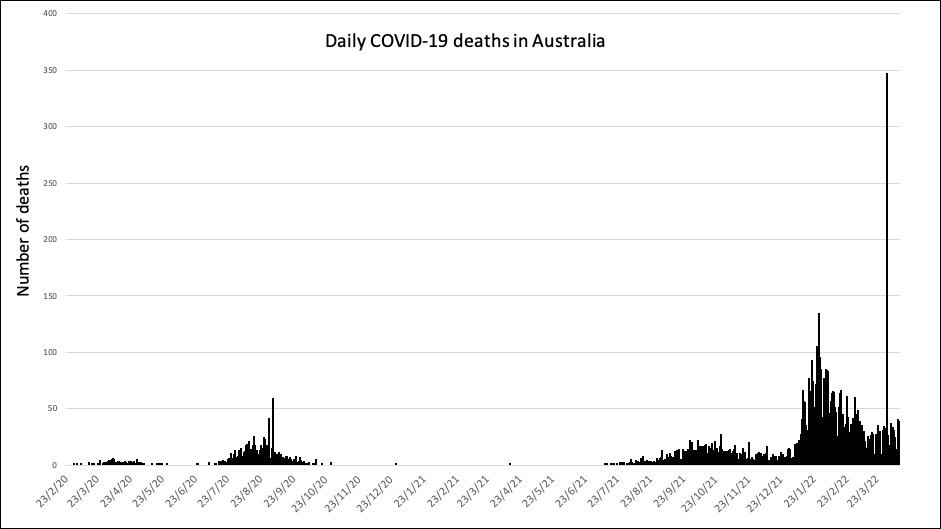And there were almost four billion covid infections even before Omicron.
Welcome to The Medical Republic’s Covid Catch-Up.
It’s the latest covid news in one convenient post. Email bianca@biancanogrady.com with tips, comments or suggestions.
14 April
- Fourth dose of Pfizer vaccine reduces risk of covid death by 74% in over-60s.
- One in four humans on the planet have had covid at least once.
- Risk of myopericarditis similar for influenza and covid vaccines.
- Covid still a global public health emergency, says WHO.
- Covid killed 186 Australians in the past week.
A fourth dose of the Pfizer vaccine in over-60s halves the risk of symptomatic covid and reduces the risk of death by 74% in the month after being vaccinated, according to data from Israel.
Writing in the New England Journal of Medicine, researchers presented data from 182,000 people aged over 60 years who were given a second booster dose at least four months after their first booster, and who were matched to a similar number of controls not given a booster.
After around 30 days of follow-up, researchers saw a 45% lower risk of PCR-confirmed SARS-CoV-2 infection, 55% lower risk of symptomatic infection, 68% lower risk of covid hospitalisation, 62% lower risk of severe covid and 74% lower risk of death from covid with a fourth dose compared to three doses.
The study took place over January and February 2022, during which time both Delta and Omicron were circulating.
Nearly half the world’s population had been infected with SARS-CoV-2 at least once even before the Omicron wave, new research suggests, though rates vary radically from nation to nation.
A paper published in The Lancet estimated global, regional and national covid infections through to November 2021, using a combination of reported cases and deaths, hospital admissions, and data from seroprevalence surveys, which researchers also adjusted using data on excess mortality and reinfections.
They estimated there had been 3.8 billion infections and reinfections since the start of the pandemic, in 3.39 billion people, which meant nearly 43% of the world’s population had been infected with SARS-CoV-2 at least once.
The analysis stopped just before the Omicron wave, and the authors said cumulative infections might now be more than double the figures to November 2021.
In countries such as Afghanistan, Ethiopia, Armenia, Albania, and cities including Delhi, cumulative infection rates were above 80%, while in Australia the rate is just 1.4%.
The analysis revealed significant differences in cumulative infection rates even between countries that shared borders. For example, Norway’s infection rate was 11.5%, while in neighbouring Sweden it was 22.4%.
“In these two countries, testing and contact tracing strategies, government restrictions, and mobility patterns varied substantially, contributing to substantially different SARS-CoV-2 infection outcomes,” the authors wrote.
There is a glimmer of hope in the latest global figures from the World Health Organisation showing a 24% drop in new infections and 18% drop in deaths in the past week compared to the previous week.
That’s if you trust the WHO numbers. In contrast to the figures from the Lancet study, WHO has only registered around half a billion confirmed cases of covid in total since the pandemic began. This only reflects the official numbers recorded in each country, and not the true count estimated from the range of sources described above.
Covid vaccines have a similar risk of myopericarditis to influenza vaccines, and a significantly lower risk than for smallpox vaccines, research suggests.
A systematic review and meta-analysis published in The Lancet Respiratory Medicine looked at reported rates of myocarditis and pericarditis in 22 studies involving more than 400 million vaccine doses.
Overall, the rate of myopericarditis across all vaccines was around 33 cases per million doses of vaccine. For covid vaccines it was 18 cases per million doses – slightly higher for the mRNA types – and for non-covid vaccines it was 56 cases per million doses.
Influenza vaccines were similar, whereas the smallpox vaccine was associated with around 132 cases per million doses.
The study also confirmed that the risk of myopericarditis was significantly higher among males under 30.
In case there was any sense that the covid crisis is waning, the WHO says the pandemic is still a public health emergency of international concern – a status it first declared on 30 January 2020.
The latest meeting of the WHO’s emergency committee formed to deal with the covid pandemic has reiterated the serious situation of covid globally, and the importance of ongoing public health measures to contain the virus.
These include setting the goal of every nation having at least 70% of its population vaccinated by July 2022. The committee acknowledged that international travel bans were no longer effective in containing spread of the disease since the emergence of Omicron, and border public health measures such as screening, isolation and quarantine of travellers should be based on risk assessments.
They also noted the challenge of “pandemic fatigue”, and said countries need to counter misinformation, be clear and transparent in their communication, and work to rebuild trust from communities.
Covid claimed 186 lives in Australia over the past week.



